The following piece was written in response to the many snippy emails I’ve been getting. Those that actually said something outside “You Suck” or some variation of same essentially fall into two distinct categories: those that found my reviews too negative or their subjects too obscure.
Okay. The “too negative” folks must be delusional, as I’ve given quite a few unqualified raves. For that matter, I’m well aware that my negative reviews, for flicks like SIX DAYS, SIX NIGHTS or ANGST, will inspire readers to seek them out and form their own opinions, and that’s fine with me.
Concerning the “too obscure” charge, and in particular the person who complained that I waste too much time on movies “nobody’s ever heard of” while neglecting “important” fare like THE RING and THE SCORPION KING, my response is twofold: a). Those particular movies have multi-million dollar advertising budgets and so don’t need coverage from me, and b). I hated ’em both and won’t waste the space.
In the spirit of fairness, however, I’ll take a look at five movies that are not foreign or independent but fairly recent products of major Hollywood studios (in one case a mini major) that DID play in a theater near you, and can now most likely all be found in your local Blockbuster. The only thing is that, unlike many of the “obscure” films I review, none of the following have attracted much of a cult following…something I’m hoping this piece will go some way toward rectifying. And yes, in contrast to my apparent plethora of negative reviews, all earn unqualified raves.
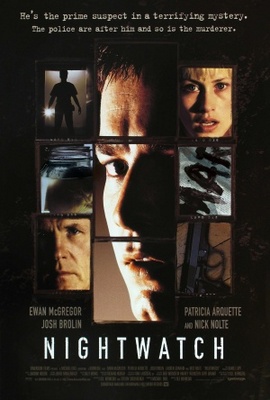 First up is 1998’s NIGHTWATCH, the Miramax sponsored remake of the acclaimed 1994 Dutch production NATTEVAGTEN. Remakes are always a dicey proposition, and it could be argued that Miramax shot itself in foot commercially by following the same route 20th Century Fox did with its disastrous ’93 redo of George Sluizer’s Dutch masterpiece THE VANISHING: hiring the original director, Ole Bornedal in this case, to remake his own movie with Hollywood stars.
First up is 1998’s NIGHTWATCH, the Miramax sponsored remake of the acclaimed 1994 Dutch production NATTEVAGTEN. Remakes are always a dicey proposition, and it could be argued that Miramax shot itself in foot commercially by following the same route 20th Century Fox did with its disastrous ’93 redo of George Sluizer’s Dutch masterpiece THE VANISHING: hiring the original director, Ole Bornedal in this case, to remake his own movie with Hollywood stars.
It certainly sounds like a bad idea, particularly since Hollywood rarely ever releases the original film in these cases (example: the 1994 French-Canadian comedy LOUIS THE 19th, KING OF THE AIRWAVES, remade by Hollywood as ED TV but never given US distribution). The release of the original NATTEVAGTEN on DVD last year was a pivotal one, as it afforded me a chance to contrast the two versions. Contrary to what many would have you believe, Bornedal’s remake follows the original film, a creepy account of a college kid who takes a job in a morgue where a necrophile may be loose, extremely closely. Both films are extremely skillfully made scarefests, but the remake is superior in at least one respect: its character development.
Quite simply, the characters in NIGHTWATCH are sympathetic and those in NATTEVAGTEN are not. This is probably due to the presence of charismatic performers like Ewan MacGregor, Patricia Arquette and Nick Nolte, who for me far outpace the original film’s cast. In this case, it seems the “Hollywoodization” of Bornedal’s film was—for once—a good thing. I’m all for Hollywood bashing (God knows I’ve indulged in more than enough of it myself), but it means NOTHING if we look the other way on those (admittedly brief) occasions when the system actually works.
NIGHTWATCH is definitely an example of a Hollywood product that works, particularly on a big screen. Experiencing this chiller in an air conditioned theater was an unforgettable experience; as the horror mounted, the audience left in droves until by the end I was one of just two people left in the auditorium (and the other person only stayed, I’m sure, because she was with me!). This would seem to prove something I’ve long suspected: that today’s audiences have been so conditioned by the SCREAM flicks and their insidious offspring they can no longer handle a REAL horror movie.
In NIGHTWATCH, Bornedal doesn’t want to explore the human condition and pays the concept of social responsibility little heed. He (to borrow a phrase from Stephen King) just wants to get’cha!
Taking a 180-degree turn, we come to Spike Lee’s neglected 1999 Disney(!) production SUMMER OF SAM. Unlike the previous film, this is a socially conscious look at the events surrounding some 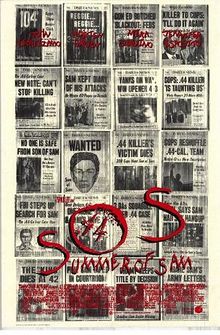 very real murders. David Berkowitz was the “Son of Sam,” a nutcase who terrorized New York City back in 1977 with a series of random shootings he claimed were committed on the orders of a dog.
very real murders. David Berkowitz was the “Son of Sam,” a nutcase who terrorized New York City back in 1977 with a series of random shootings he claimed were committed on the orders of a dog.
SUMMER OF SAM is a superb film, suspenseful and provocative, but it’s been vastly misunderstood. Critics were apparently expecting a HENRY: PORTRAIT OF A SERIAL KILLER-like look into the mind of David Berkowitz, but Lee had other ideas. Although DB, superbly played by Michael Badalucco, is featured prominently (a scene featuring the deranged Berkowitz chatting with a dog is easily the film’s weakest), the film’s real subjects are the citizens of an Italian-American community impacted by Berkowitz’s reign of terror.
John Leguizamo gives one of the finest performances of recent years as a nice Italian boy (in an intriguing reversal of a standard casting practice, Lee has Leguizamo, a Latin, playing a white person) driven to near-madness. In this film the specter of the Son of Sam assumes parasitic dimensions, affecting the ways people think and interact: misunderstandings become murderous, apprehension turns to paranoia and sexuality grows increasingly perverted.
Let me take a moment to address some of the criticisms this film has received. Issue was taken with its supposedly “inaccurate” portrayal of the Italian-American community, and yet no less an authority than MEAN STREETS/TAXI DRIVER/GOODFELLAS/GANGS OF NEW YORK’S legendary Martin Scorsese has publicly stated otherwise. Many critics also took the opportunity to bash Spike Lee himself. I’m not arguing that the guy’s an ass, but I’d advise criticizing the movie and not its maker (otherwise we couldn’t watch the films of Hitchcock, R.W. Fassbinder or Roman Polanski). And then there were the all-too-predictable charges of excessive sex and violence.
Please! In exploring the way people’s psyches are affected by the specters of fear and paranoia, I don’t see how one could possibly avoid explicit depictions of sex and violence.
Furthermore, SUMMER OF SAM is more pertinent today than when it was first released. Its cautionary look at the consequences of unchecked apprehension is one that, in these uncertain days of post-9/11 angst, we’d do well to pay close attention.
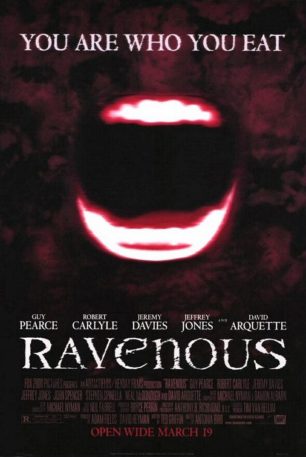 Another neglected 1999 big studio gem is RAVENOUS, a product of Twentieth Century Fox’s Fox 2000 division. It doesn’t surprise me that mainstream audiences rejected this outrageous horror-fest, but I was certain it would quickly gain a cult following, as at least two other Fox 2000 productions—FIGHT CLUB and PUSHING TIN—have. Well, nearly four years after RAVENOUS’s release, that cult has yet to materialize. I guess its witty mix of historical revisionism and unflinching grue is just too unique for today’s horror fans, who tend to prefer their cinema cut and dried.
Another neglected 1999 big studio gem is RAVENOUS, a product of Twentieth Century Fox’s Fox 2000 division. It doesn’t surprise me that mainstream audiences rejected this outrageous horror-fest, but I was certain it would quickly gain a cult following, as at least two other Fox 2000 productions—FIGHT CLUB and PUSHING TIN—have. Well, nearly four years after RAVENOUS’s release, that cult has yet to materialize. I guess its witty mix of historical revisionism and unflinching grue is just too unique for today’s horror fans, who tend to prefer their cinema cut and dried.
Still, adventurous filmgoers are urged to check this one out. Set in a mountainous, snow bound 19th Century landscape, it’s a western of sorts about a band of soldiers adrift during the Mexican-American war who find themselves set upon by a vampiric cannibal (Robert Carlyle). The cast and director (the respected British helmer Antonia Bird) are not known for making horror movies, which in this case is a bonus.
RAVENOUS resolutely avoids standard horror movie cliches; there are no old dark castles in sight, the obnoxious false scares beloved by so many of today’s horror filmmakers are kept to a minimum, and much of it takes place in broad daylight. Also worth noting is the wonderfully off-kilter, faux Americana score by Michael Nyman and Damon Albern, which put me in mind of 2000 MANIACS. And the climactic over the top death duel is one of the most satisfying movie finales in recent memory, with a capper that wreaks an unforgettably perverse twist on the concept of manifest destiny.
Next up is 2001’s Warner Brothers release THE PLEDGE, written and directed by Sean Penn—yes, that Sean Penn! Like the aforementioned 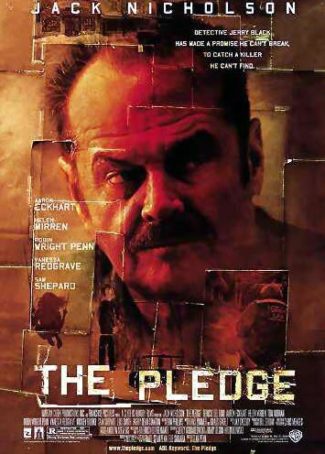 Spike Lee film, much of THE PLEDGE’s criticism was centered more around its director than the film itself. Yes, Sean Penn is a jerk, but please, let’s judge the film on its own merits.
Spike Lee film, much of THE PLEDGE’s criticism was centered more around its director than the film itself. Yes, Sean Penn is a jerk, but please, let’s judge the film on its own merits.
THE PLEDGE is very “European” in tone, no question, and like many European films it demands to be seen more than once. Upon first viewing, I’ll admit I wasn’t all that impressed; I found many of the visuals unnecessarily show-offy and the frequent celebrity cameos by Penn’s Hollywood buddies (like Mickey Rourke and Benicio Del Toro) plain distracting.
The film drew me back, though, and now, after having seen it at least four times, my initial criticisms have all pretty much dissolved. Far from the standard issue cop movie Warners promoted it as, THE PLEDGE is a chilling and disturbing psychological horror story charting a retired cop’s descent into madness, triggered by a misplaced vow made to a distraught mother. Jack Nicholson gives one of his best-ever performances in the lead role, and Penn proves himself a director to be reckoned with—even if, as a person, he leaves something to be desired!
Closing things off, we come to Columbia’s 1998 Stephen King adaptation APT PUPIL, another neglected psychological chiller. No mention of this film is complete without noting the insanely terrible pre-release publicity foisted upon it. As for the film itself…
I find Stephen King’s novella, published as part of his DIFFERENT SEASONS collection, one of his most effective works, and Singer preserves much of what makes it such an unforgettable experience. As with King, his point seems to be that we, like the story’s central character, have a none-too-secret fascination with what the Nazis did, a fascination that if allowed to fester could turn into something far more insidious.
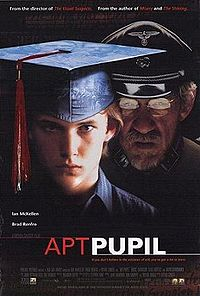 The 1980’s-set story concerns an all-American boy (Brad Renfro) who befriends an aging Nazi (Ian McKellan); in the course of the film, the boy finds himself drawn into the latter’s world and in the process discovers his “inner Nazi.” APT PUPIL’S view of Nazism is an unprecedented one, divorced from standard political explanations (such as just-following-orders excuses or even anti-Semitism) and stripped down to its core: a love of sadism and absolute control that festers in all of us, whether we admit to it or not.
The 1980’s-set story concerns an all-American boy (Brad Renfro) who befriends an aging Nazi (Ian McKellan); in the course of the film, the boy finds himself drawn into the latter’s world and in the process discovers his “inner Nazi.” APT PUPIL’S view of Nazism is an unprecedented one, divorced from standard political explanations (such as just-following-orders excuses or even anti-Semitism) and stripped down to its core: a love of sadism and absolute control that festers in all of us, whether we admit to it or not.
APT PUPIL does have some flaws. Scenes involving a cat in an oven and a cadaver in a basement seemed plain gratuitous, and I’m a little nonplussed that the ending was toned down from that of King’s original (which, conveyed via one of the most chilling final sentences ever, had the totally unhinged protagonist embark on a disturbingly prophetic shooting spree). But when Singer hits his marks the results are explosive, in particular the sight of McKellan finding that a newly purchased Nazi costume fits him all too well, and his climactic confrontation with a terrified concentration camp survivor. Profoundly disturbing stuff that you may just find, like most of the other films on this list, disconcertingly close to home.
